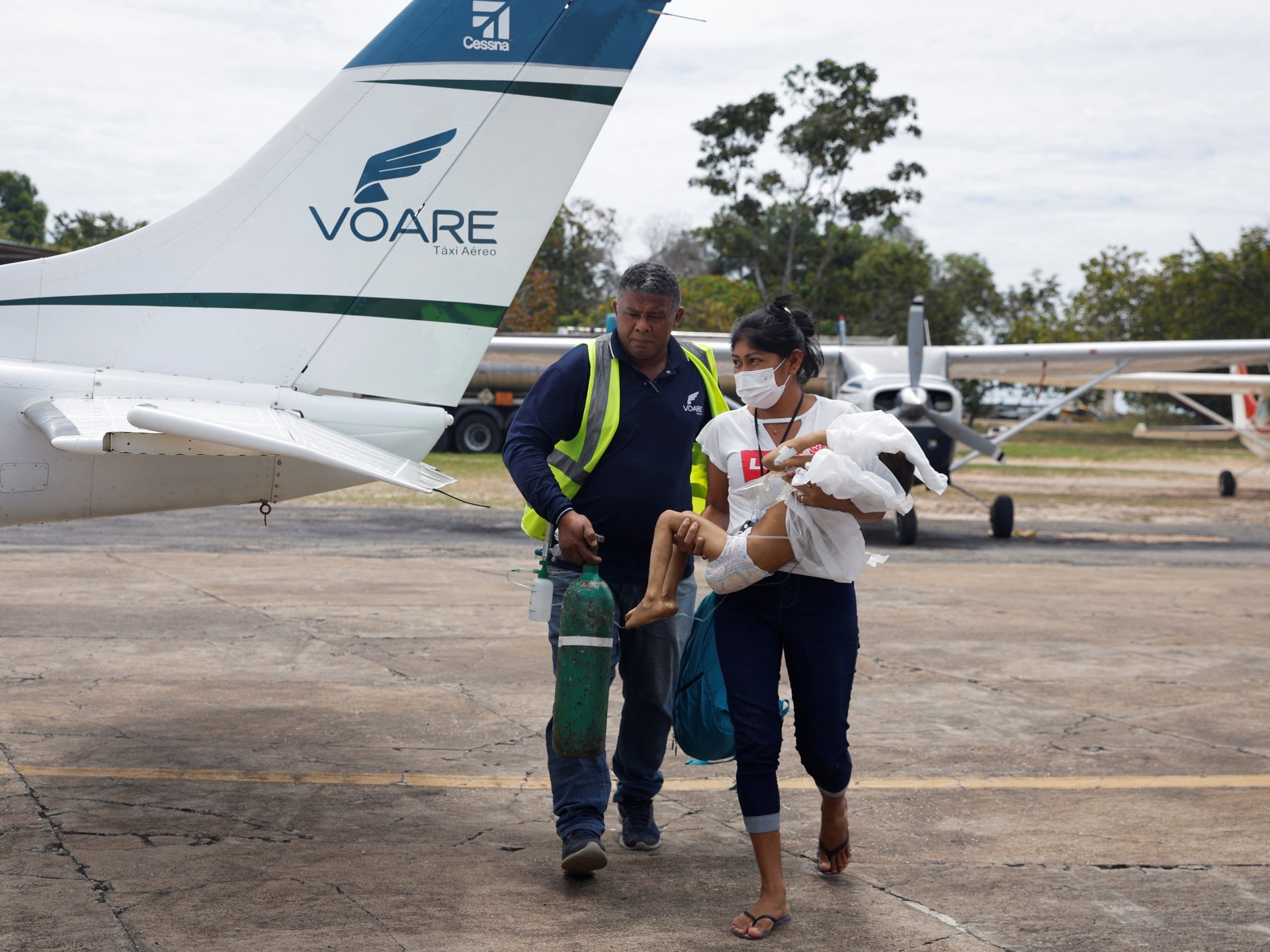Brasilia
- Tragic conditions suffered by the indigenous people (Native Americans) in the states of Roraima and Amazonia in northern Brazil due to dozens of deaths and malnutrition among children, as well as the policy of controlling forest lands, which is a source of livelihood.
Communication in the country was full of discussions, seminars, and news dealing with this tragedy, amid appeals to President Lula da Silva to put an end to the abuses of mining companies in the region, and accusations of former President Jair Bolsonaro's government of collusion with mining companies and agricultural landowners.
"General figures indicate the death of 570 children between the ages of 1-5 years from 2019 to 2022," said the legal advisor defending the rights of indigenous peoples, Valdemir Soares Jr., in a statement to Al Jazeera Net.
He adds that these numbers are inaccurate because not all deaths are reported, and knowing the numbers accurately is very difficult due to the isolation of the region (north of Roraima), and the lack of federal and local health care institutions specialized in caring for indigenous people plays a role in the lack of control over deaths and knowing their numbers properly. Flour.
The Brazilian government attributed child deaths to malnutrition (Reuters)
Mining is the killer
And Raquel Tremembe, the former candidate for the position of Vice President of the Republic in the last elections, who is an indigenous citizen, believes in a statement to Al Jazeera Net that "what kills the Yanomami is not hunger, but rather mining that kills and clears forests. Condemnations have continued for more than 10 years, and this human tragedy is not limited to The Yanomami are in Roraima, so many lives are being lost every day and nothing is really being done."
As for the geographical researcher at the Federal University of Sao Paulo, Jefferson Choma, he held the former president responsible for the tragic conditions experienced by the Yanomami people.
“It is a genocide declared and planned by the state, and its main responsibility rests with Bolsonaro,” Choma said. “Since he was a federal deputy, he advocated the idea of controlling indigenous lands, and as president he opened those lands to mining companies, which is what caused the destruction and violence that we see now.” .
And about whether there are laws that protect the indigenous people from the abuses practiced by the mining and agricultural companies that are trying to control the region, Chuma says, "Mining is prohibited in the lands of the indigenous people, and this can only be done with the permission of the Federal Parliament, where the state owns the inside and outside of the earth, and grant it as a usufruct to indigenous peoples.”
He continued, "In the 1988 Federal Constitution, there was an important victory for the Native Americans after the passage of Chapter VIII, of which Article 231 recognizes the social organization, customs, languages, beliefs, and traditions of indigenous peoples and their indigenous rights to the lands they traditionally occupy."
Researchers blame former President Bolsonaro for the tragic conditions of the Yanomami people (Getty Images)
The Yanomami people under the Bolsonaro government
Indigenous rights legal advisor Waldemir Jr. says the status of the ethnic group has been humiliating under the Bolsonaro government as mining activity and deforestation increased in 2016 due to Bolsonaro's support for and legalization of mining through the exploitation of indigenous lands.
He added that there were many politicians who agreed with Bolsonaro on this policy, such as Aldo Rebelo, former Secretary General of the Communist Party, who was Minister of Defense in the first da Silva administration.
Tremembe reaffirms that since the promulgation of the 1988 constitution, all governments, regardless of their orientations, have neglected indigenous peoples or acted against them, while Bolsonaro has deepened attacks against more than 300 ethnic groups, especially those in the vital region of the Amazon. In the past four years, prospectors and loggers have worked illegally. The lawyers were in front of the government, and they threatened and killed anyone who resisted them.
The Yanomami people resist government policies to control their lands (Getty Images)
Did the Yanomami people organize themselves to resist the abuses?
Jefferson replies, "Yes, as well as other ethnic groups who also face the invasion of their lands by miners to extract mineral wealth. The resistance of the Yanomami and other indigenous peoples has been part of their history from the beginning of colonization centuries ago to today."
And Raquel adds, "We have been resisting these attacks for 522 years for our right to exist and to preserve our ways of life. The forest is the womb of the earth, and it contains an entire biodiversity that screams every day to survive."
Is it possible to bet on the da Silva administration to protect the indigenous people?
“It is imperative that da Silva's government commit to demarcating all indigenous lands by 2026,” says Raquel, noting that the symbolism of creating the Ministry of Indigenous Peoples is meaningless. Therefore, resistance and struggle is the best way to ensure our dignity and survival."
While Junior points to "the possibility that da Silva could promote some changes in order to protect the indigenous peoples," noting that the creation of the Ministry of Indigenous Peoples was an important decision, but more work is needed to confront the miners.

